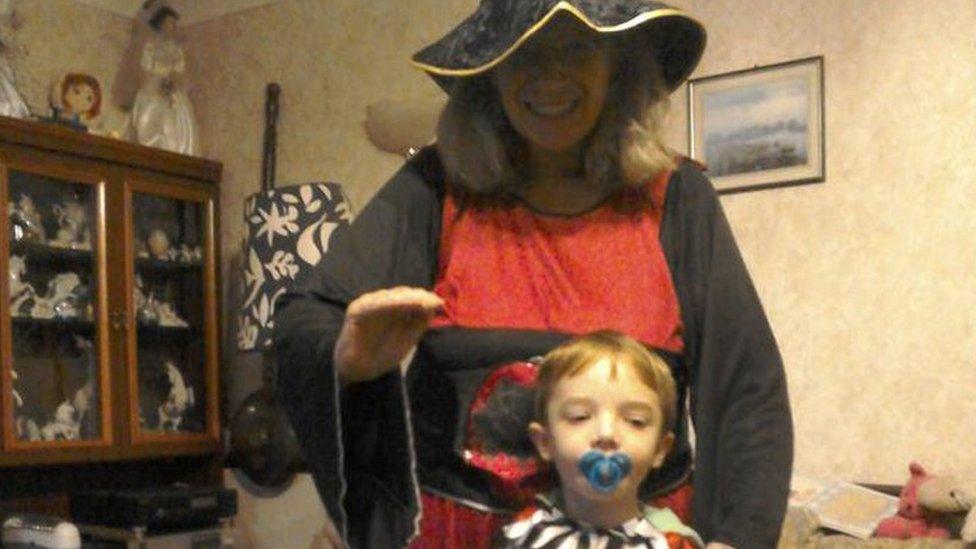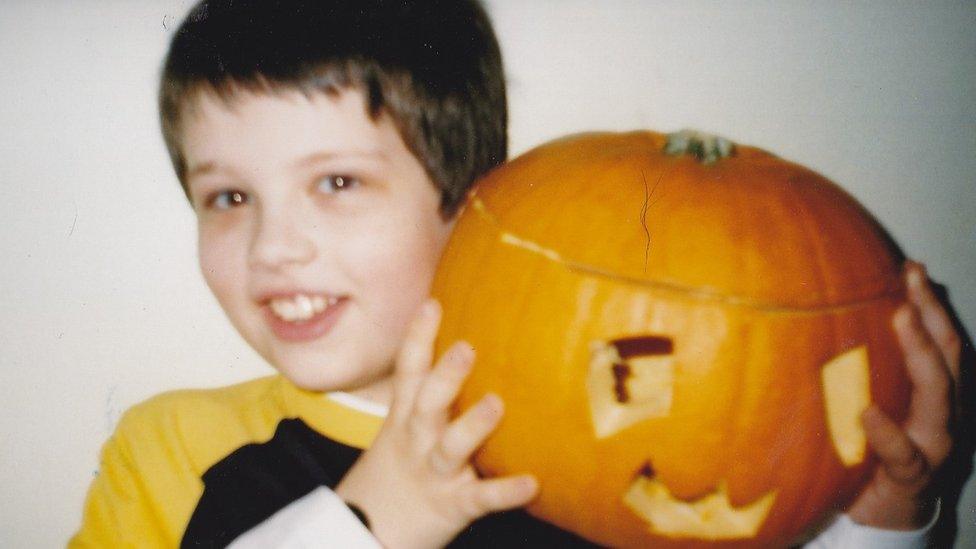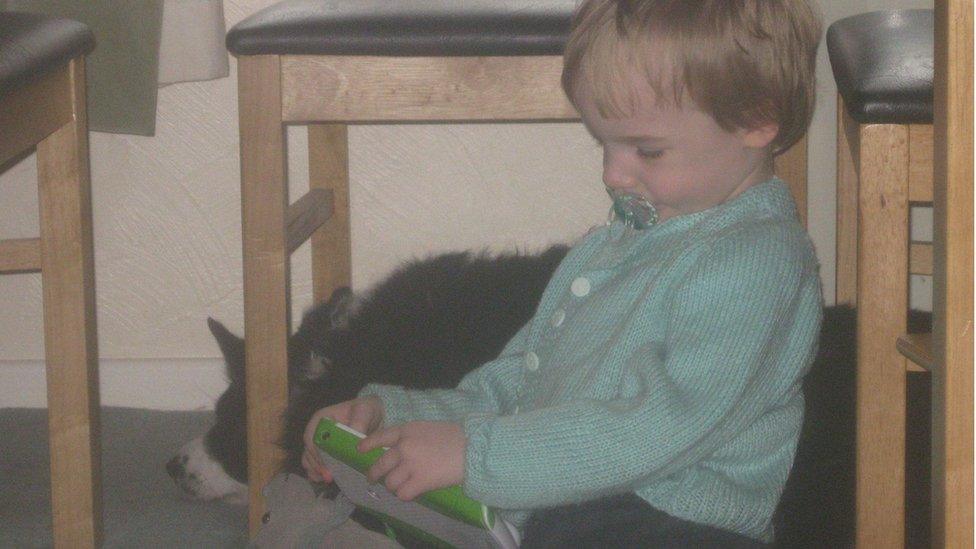Autism: Carving out a Happy Halloween for children
- Published

Ben and his mother, Maria, getting ready for Halloween
Witches and wizards and ghouls - yes, Halloween is upon us.
But for some children and their families the celebrations can overwhelm as much as excite.
And even if you don't 'do' Halloween, it's hard to escape the decorations and endless paraphernalia lining the High Street.
Maria Greenwood explains why her family have to think a little bit differently when it comes to creating a Halloween her son, Ben, can enjoy.
Her seven-year-old has autism, external and is unable to speak but Maria and her husband, Gerald Greenwood, work tirelessly to give him a Halloween to remember for all of the right reasons.

What is autism?
It is part of a range of conditions known as autistic spectrum disorders (ASDs)
It can affect how a person communicates with and relates to other people
Autism is a hidden disability - you cannot always tell if someone has it
It can cause issues with social interaction, language skills and physical behaviour and some may also be sensitive to everyday sensory information such as the feel of certain fabrics on their skin
Autism can vary from mild to severe and can affect each person differently

"Not many people understand about children with autism or how it affects the parents," Maria said. "A child like Ben is hard work and planning well in advance is a big deal.
"But when you see that little smile or your child is jumping up and down excitedly, even if you have had something on display for months, it is worth it."
How to do trick or treat differently
Maria has developed her own way to help Ben enjoy the tradition of trick or treat.
"I advertise for around 10 volunteers," Maria said, "We give a little toy car to the volunteers, which I buy myself, and Ben collects them as he goes around.
"Ben doesn't really eat apart from a few spoonfuls of his favourite dessert so it's no good giving him sweets but he absolutely loves those little cars made of metal - he adores them.
"When Ben arrives at their [volunteer's] door he hands over a little card saying trick or treat on it. Once they have dropped the toy car in his bucket he will sign "thank you" in Makaton, a language which uses signs and symbols instead of the spoken word to help people communicate.
"We have sweets for when the other children come round but Ben does not eat them. He collects chocolate bars and licks the outside wrappers but nothing more.
"He gets very excited when the others come round but only glances at them and runs away back into the living room."

What the experts say
Jane Donlan is an author and blogger, external with first-hand experience of bringing up a child with autism. She believes there are "two main challenges" facing parents of autistic children during the October festivities.

Jane's son Paddy-Joe, now 21 and a published author himself, when he was younger, celebrating Halloween
"The first thing is change, even if it is a positive one," she said. "Around Halloween there are changes to routine, changes to food, changes to a lot of things and even if the change is something really good it will still have an impact and can be really hard.
"The other thing is sensory overload - there are so many new things to touch, smell, taste and see on Halloween, sometimes it can just be too much and leave the person with autism feeling overwhelmed and stressed."
But she firmly believes that despite the challenges it is possible for every child to have a happy Halloween.
"It's just a case of adapting things to suit each individual child and doing what is fun for them.
"Also it's so important to remember that anxiety, stress and sensory overload can last for days or even weeks after such a big change in routine as Halloween - so it is important to plan enough time for recovery after the event as well."

Preparation is key
Maria has mastered meticulous planning and thinking ahead because any last-minute changes can affect Ben and lead to him feeling overwhelmed.
She said: "This year I have bought him a T-shirt with a zombie on it to wear and it's been hanging up in his bedroom for a month so he can see it and get used to it. It is hard to get him to understand, though, especially when it's something he might only wear once.
"He is sensitive to the way things feel and so will only wear certain clothes and you can't really go further than jeans and a T-shirt so I often find I have to adapt with costumes."
Maria also harnesses Ben's inquisitive nature and love of technology by using a tablet to help explain upcoming seasonal celebrations - an avid watcher of YouTube, he rates the Halloween alphabet app amongst his favourites at this time of year.

Ben has a wicked sense of humour and loves looking up seasonal jokes on his tablet to share with people
Other celebrations during the year also require a creative approach.
"It is hard," Maria said. "We have to celebrate everything differently, not just Halloween, but birthdays and Christmas as well.
Maria said: "For Christmas we leave the presents out a week in advance so he sees them. The first few weeks he tries to put them out of the house.
"We do not have Christmas music or parties. We wrap nothing. No advent calendars or singing. It's really sad.
'Go with the flow'
"Ben's dad dresses up as Santa for the local celebrations and he would love nothing more than for Ben to able to sit on his knee and tell him what he would like for Christmas, but that's not going to happen."
Maria, who uses her experiences to write her Ben and Tony Bear books, external, remains positive and upbeat throughout
"Ben is worth all that hard work," she said.
Her one piece of advice to other parents is that "there is always a way around things, just go with the flow."